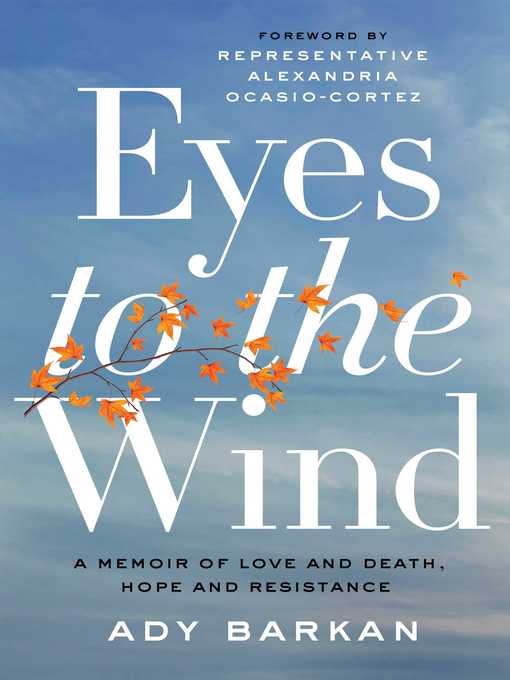
Eyes to the Wind
A Memoir of Love and Death, Hope and Resistance
فرمت کتاب
ebook
تاریخ انتشار
2019
نویسنده
Alexandria Ocasio-Cortezناشر
Atria Booksشابک
9781982111564
کتاب های مرتبط
- اطلاعات
- نقد و بررسی
- دیدگاه کاربران
نقد و بررسی

June 24, 2019
Activist Barkan relates in this candid memoir how, after receiving a terminal illness diagnosis at age 32, he had to negotiate his failing body as his political star rose. In 2016, Barkan was diagnosed with ALS and given three to four years to live. Fueled by anger over his “outrageous” situation, he sought to leave a legacy for his baby son and wife. A lawyer at the Center for Popular Democracy, Barkan initially resumed work on Fed Up, a campaign to encourage the Federal Reserve to enact policies beneficial to working-class Americans, but soon pivoted to health care, “bird-dogging” members of Congress in visits to the Capitol. Barkan was wheelchair-bound by spring 2018 yet he embarked on a six-week cross-country tour in support of Democrats in the midterm elections (a sincere conversation with Arizona senator Jeff Flake about how a GOP tax plan would affect Medicare was captured in a video that went viral), ultimately sharing the stage with Alexandra Ocasio-Cortez and Bernie Sanders. Throughout, Barkan weaves tales of law school and clerkships with insights into community organizing (a national movement led by a single person could “never approach the transformative political power that would be unleased by genuine mass movement of organized working-class people”). Barkan’s powerful narrative gives great insight into the nuts and bolts of political activism at work.

July 1, 2019
A noted progressive activist's account of his twin battles for social justice and against early-onset amyotrophic lateral sclerosis. When Barkan celebrated his first wedding anniversary in 2016, he counted himself and his wife "the happiest and luckiest people we knew." Both had jobs they loved, the author as an activist/lawyer for the Center for Popular Democracy and his wife as an English professor. Days later, he learned that what he thought was carpal tunnel syndrome was actually ALS. In this memoir, which he initially wrote to leave behind for both the progressive movement and the infant son he would not see grow to adulthood, Barkan looks back on his life and achievements. He begins with his social conscience awakening at Columbia University, where he became involved in radical political organizations. At Yale Law School, Barkan threw himself into work advocating for immigrant and worker rights. Rather than become a civil rights lawyer, the author did what "got my blood pumping": argue about public policy and organize protests. At the end of the Occupy movement, he organized the Fed Up campaign, which sought to change Federal Reserve monetary policies to help low-income people. But just as Fed Up began gaining notoriety and traction several years later, Barkan faced increasing physical difficulties. In May 2017, he walked with a leg brace; by early 2018, he was wheelchair-bound and needed a ventilator to breathe. Despite the deep strains his condition produced in his marriage, he continued to fight alongside other progressives, embarking on a summertime "six-week, twenty-state trip, from California to Maine," to help change the balance of power in Congress. Though sometimes self-congratulatory in tone, Barkan's book--part of which he wrote with the assistance of a technology that allowed him to use only his eyes--still moves with its portrait of a man driven to act on his beliefs while learning to accept the injustice of early mortality. Not without flaws but unquestionably inspiring.
COPYRIGHT(2019) Kirkus Reviews, ALL RIGHTS RESERVED.

September 1, 2019
Authoring one's own narrative, according to lawyer-turned-community organizer Barkan, means knowing what to resist and what to accept. Barkan, who lives with amyotrophic lateral sclerosis (ALS), has long been outspoken about the importance of local politics in order to enact change. He continues that story in his meandering first book while also grappling with the paradox of privilege and misfortune, feeling distressed about the future and sometimes unable to think about the present. Barkan's story comes alive during his college years, when he discovers his passion for the intersection of journalism, politics, and law. His memoir covers a range of time periods and topics, including his years as a law clerk, his involvement in Occupy Wall Street, and later becoming an activist and advocating for government reform. A recurring concern for Barkan, as he contemplates how to handle his health's decline, is not being able to provide for his son; his wife, Rachael, begins to take on the majority of parenting responsibilities. Noticing his speech and voice changing, Barkan wonders, "What do I want to say? To whom? And how?" VERDICT Though Barkan's memoir at times feels a little rushed and unfinished, his life in social justice is a story worth telling.--Stephanie Sendaula, Library Journal
Copyright 2019 Library Journal, LLC Used with permission.

August 1, 2019
When his son was four months old, Barkan mentioned the weakness in his left hand to a friend who raised alarm bells. A subsequent ALS diagnosis changed Barkan in profound ways. This memoir chronicles September 2016 to December 2018, when Barkan's young life became a simultaneous retraction (of physical movement) and expansion (of political influence). His progression toward early death amplifies his life's work: social justice. He keeps despair at the loss of his promising future at bay with resistance, both before and after Trump's gut-wrenching election. A video of his 2017 encounter on a plane with then-senator Jeff Flake goes viral and becomes a game changer. In Barkan's closing analysis, his memoir reads as a political activist's handbook, detailing names, places, dates, strategies, tactics, relationships, mistakes, and outcomes that organizers following in his footsteps can employ. The book's primary question is existential: how to live when you are dying? Barkan's answer is to share, open up, act, and capital-R Resist, and his memoir, clearly and candidly written, establishes a legacy.(Reprinted with permission of Booklist, copyright 2019, American Library Association.)

























دیدگاه کاربران